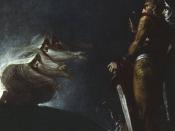At the start of Shakespeare's tragedy "Macbeth", the protagonist has a reputation for heroism; by the last act he is described as a "bloody butcher". It is true that we sympathise with Macbeth at first, particularly because of the way he is influenced by the Witches and Lady Macbeth. Nevertheless, as the play progresses, we ultimately recognise that he has to be held responsible for what happens to him.
While three Witches sing of their intention to meet Macbeth, a general in Duncan's army and, subsequently, usurper King of Scotland, whose nature is a combination "o' the milk of human kindness" and "valiant fury," King Duncan decides to confer on Macbeth the lands of the rebellious Thane of Cawdor because of his recent victories against rebels and Vikings. Macbeth and his friend Banquo encounter the three weird sisters on a dark moor: they greet Macbeth as Thane of Glamis, Thane of Cawdor, and, finally, King of Scotland.
Lady Macbeth, realising their immediate opportunity, taunts her husband, now wavering in his intention to do away with the king, into agreeing to murder Duncan that very night as he lies asleep in the castle. Lady Macbeth carefully plans their course of action: she stupefies Duncan's guards with drugged wine, laying their daggers ready for Macbeth to stab the king. Macbeth, in terrible fear and apprehension, slays the sleeping Duncan, and returns to his wife in a state of horror and foreboding. Macbeth's purpose has now been accomplished, but he lives in fear of Banquo, who appears to suspect the truth. Macbeth, tortured nightly by "terrible dreams" and fears of exposure, hires murderers to kill Banquo and his son, Fleance. They succeed in killing Banquo, but Fleance escapes. Macbeth's fears and troubled conscience drive him to return to the heath again to...


